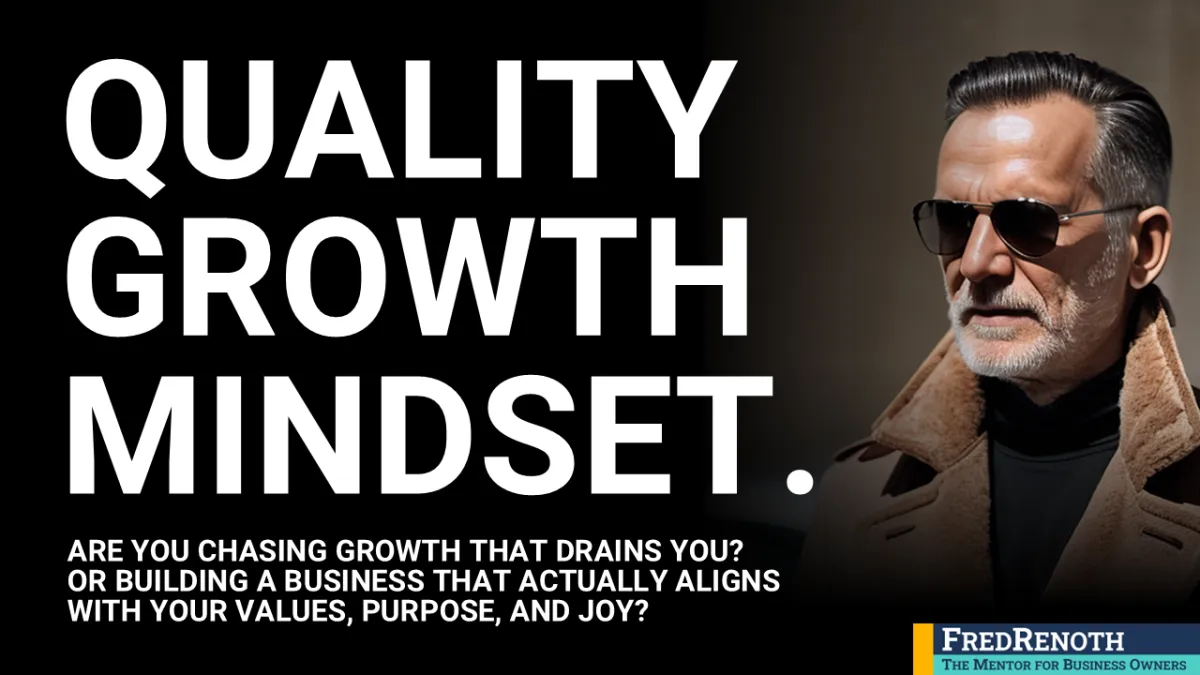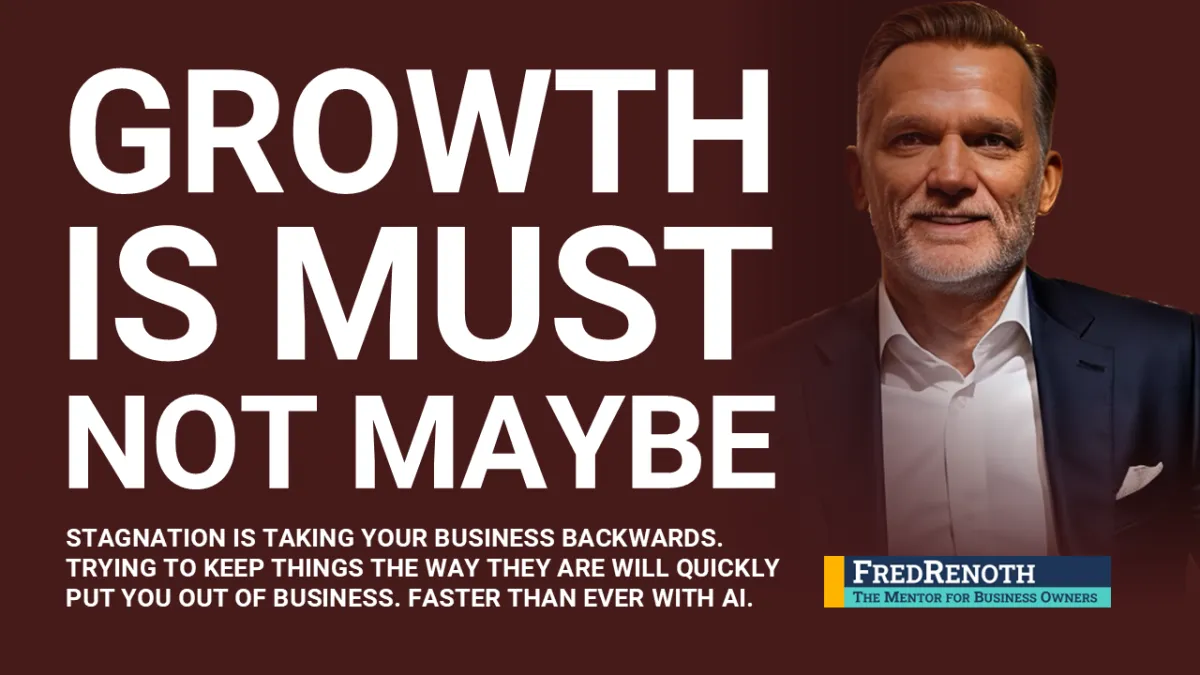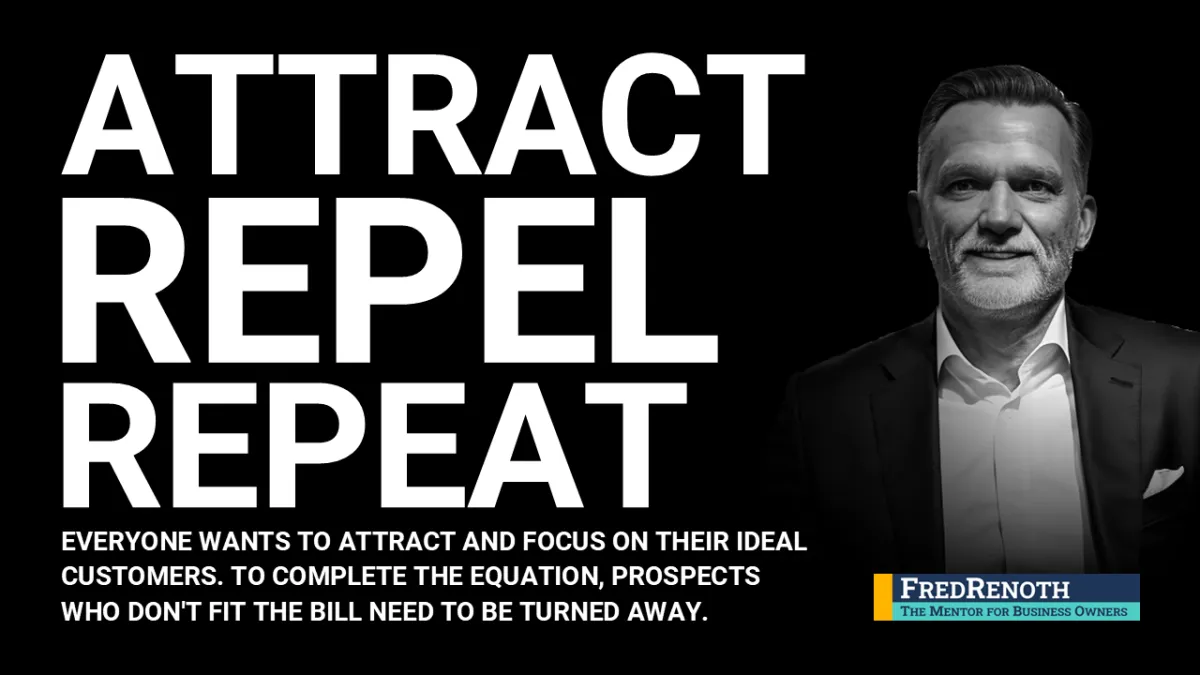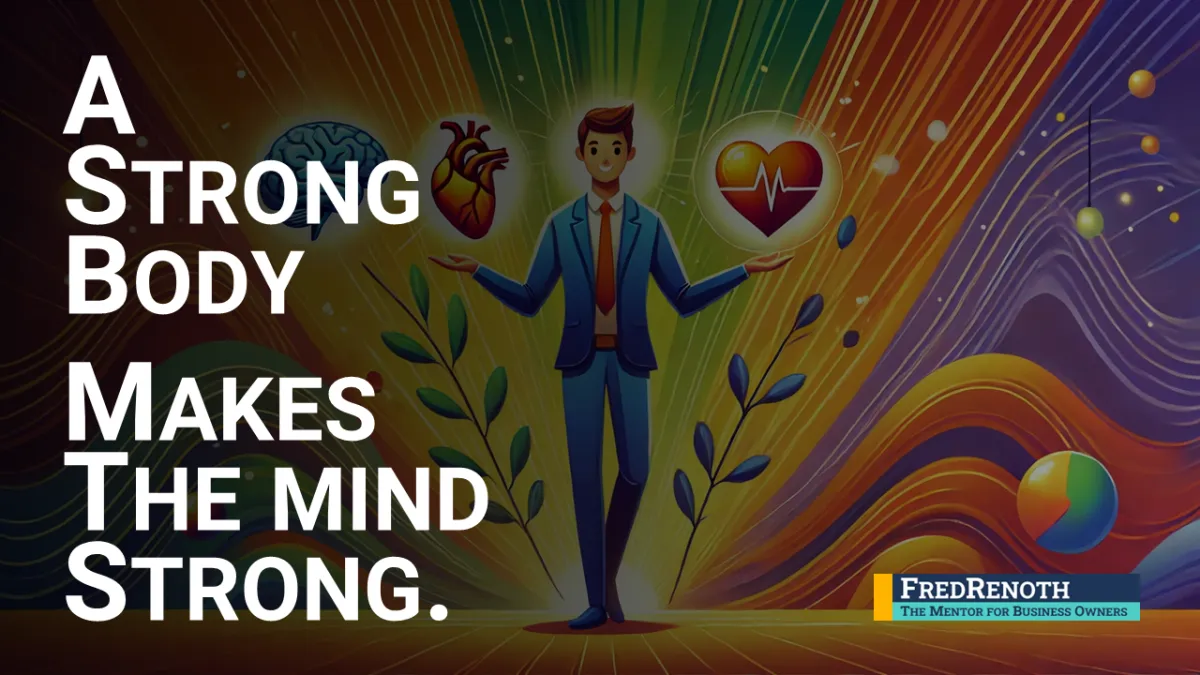


Welcome to Fred's
the Healthy Business BLOG
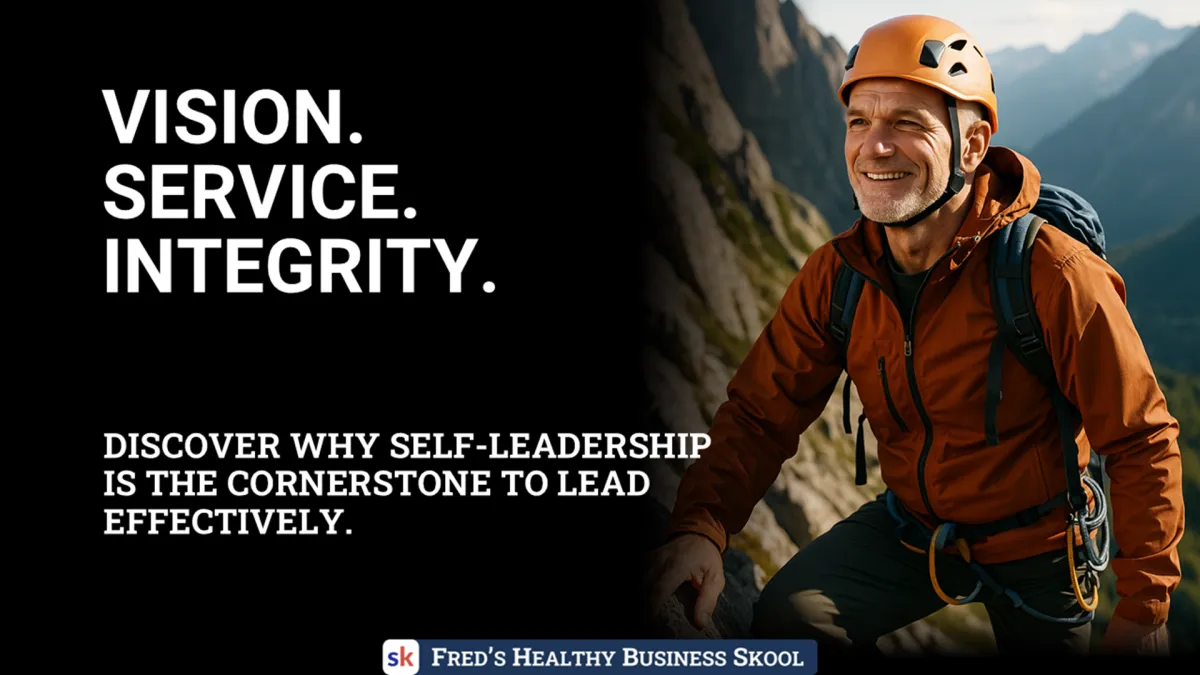
Climb Higher: The Mountain Leadership System
It's 6:15 a.m. You're up before the sun, your inbox is already going nuts, your team wants decisions, your customers want attention, and somewhere in between you're expected to market, sell, lead, grow - and breathe.
This isn't a sprint. It's not even a marathon. It's like climbing a mountain. No matter how sharp your gear is - tools, tech, talent - if the climber's off-balance, the whole expedition is at risk.
That climber is you.
A lot of people see entrepreneurship as this bold move towards freedom. But in the real world, it's a daily test of emotional resilience, mental clarity, ethical compass, and self-motivation. And here's the thing they don't tell you on startup posters: if you can't lead yourself, you'll never lead anyone else in a sustainable way.
You don't just need leadership skills, you need a leadership framework that starts where all great leadership does: inside yourself.
That's where the Mountain Leadership System (MLS) comes in.
The Unseen Weight of Leadership
Let's start with a hard truth. Every entrepreneur has three invisible leadership backpacks.
First, there's self-leadership - the choices you make in the moment, when no one's watching. Do you go with the flow or stick to your plan? So, will you face your own blind spots or distract yourself with other things?
Then there's team leadership - you're the ones guiding, inspiring, and sometimes redirecting people who look to you for structure and meaning. You're setting the emotional tone of the day. Your reactions shape the company culture. Your mood is like the weather forecast for your team.
Lastly, there's network leadership, which includes clients, partners, suppliers, and investors. They're not following your orders, but they're watching your example. Your reputation and long-term relationships are defined by your ability to influence without control.
And you carry all three loads every single day. If you don't have a solid framework, these loads can be overwhelming.
That's why we see so many entrepreneurs burning out. According to a study in the Harvard Business Review, 25% of entrepreneurs say they feel "somewhat burned out," and 3 out of 5 say their mental health suffers regularly due to stress from their leadership roles.
The real problem isn't the workload. It's leadership without grounding.
When Entrepreneurs Chase Without Leading Within
Let’s look more closely at what happens when entrepreneurs fixate on external outcomes - money, fame, power - without cultivating internal leadership.
At first, everything looks good on the surface. They chase goals with relentless ambition. They build a shiny brand, collect followers, get applause, and maybe even hit some impressive revenue milestones. On paper, it all looks like success.
But under the hood, something subtle begins to unravel. They start to drift - not because they lack direction, but because they lack internal alignment. The compass that once pointed toward purpose now spins erratically in search of validation.
They begin to measure success in vanity metrics - likes, shares, awards, even six-figure launches. These give the illusion of progress but lack the gravity to build something sustainable. The scoreboard becomes more important than the game.
And with that shift, their decision-making starts to skew. Instead of building systems, they chase trends. Instead of growing people, they promote performance theater. Trust begins to erode, often silently.
They micromanage because they no longer trust the process - or the people. What once was delegation turns into domination. Control replaces collaboration. Creativity suffocates.
They preach values in public but cut corners in private. The vision becomes diluted. The brand voice still says “authenticity,” but behind the scenes, fear and ego drive most choices. And people notice. Staff leave. Clients pull back. The mission that once felt alive now feels manufactured.
They burn bridges - not with rage, but with neglect. They stop listening, not because they’re bad people, but because they’re too busy being right. Feedback feels like a threat. Accountability becomes optional. The entrepreneur’s identity becomes tied to outcomes, not principles.
Eventually, the business becomes a hollow shell - a brand that’s beautiful to look at but empty to work in. It still gets likes. It still wins awards. But it no longer breathes.
And here’s the cruelest irony of all: most of them never see it coming. They were running too fast to look inward. They believed they were being strategic when they were just reacting. They mistook momentum for mastery.
But without a compass - without self-leadership - even the most talented, driven entrepreneur can get lost in the wilderness of their own ambition. And the higher they’ve climbed without anchoring in values, the harder the fall.
Introducing the Mountain Leadership System (MLS)
Climbers have a method. Hikers have a map. Why shouldn't leaders have a framework?
The Mountain Leadership System (MLS) was born out of a simple but powerful realization: leadership without structure is just motion without meaning. A lot of people are trying to become entrepreneurs and make a difference, but they don't have a plan, support, or a team.
They just go for it, hoping for the best. That might work for a while, but eventually the terrain changes. Things change. And without a solid framework, even the strongest climbers can lose their footing.
MLS isn't just another leadership model. It's a compass to keep you headed in the right direction. It's a climbing harness to keep you safe when things get risky. It's like a flashlight for when things get foggy and you can't see clearly. It's your guide for climbing the leadership ladder - not just to reach the top, but to make sure your team can get there too.
It mixes the proven power of Transformational Leadership—inspiring vision that lifts people beyond their current limits - with the depth of Servant Leadership - where your strength comes from helping others grow. Self-leadership is the foundation. It's the belief that if you can't lead yourself, you shouldn't lead others.
But what makes MLS stand out isn't just the theory. It's all about five core values: honesty, kindness, commitment, accountability, and consistency. These aren't just ideas - they're anchors. You either have to clip into them every day, or you risk falling into chaos.
For me, this isn't just some academic framework - it's personal. I'm a mountain boy, born and raised. Literally. Ever since I was a kid, I was leading climbing teams across tough terrain. We didn't climb for ego.
We climbed because it taught us who we were. I learned pretty quickly that the mountain doesn't care how ambitious you are. It's all about getting ready. Your mindset. Your ability to lead when the pressure's on, support your team, and keep your cool in tough situations. That experience had a huge impact on everything.
And leading a business is pretty similar. The stakes are real, even if the altitude is metaphorical. People's livelihoods depend on your stability. Your vision. Your ability to listen, adapt, and lead with confidence - not just with a good strategy.
MLS was built up over years of coaching, watching, and getting experience in the real world. What I saw was clear: the leaders who lasted weren't just smart. They were anchored. They had their own system in place.
They knew how to check in with themselves before directing others. They didn't just perform - they endured. And they lifted others with them as they rose. That's where MLS comes in.
Just a heads-up: MLS isn't for the faint of heart. This isn't some easy leadership hack. It's a climb. It's all about being honest with yourself, being kind to others, and having the guts to lead with both strength and humility. It asks you to show up every day, even when no one's watching. It asks you to match your walk with your talk - and to get back up when you fall short.
It's not about being perfect. It's about becoming real. And what about real leadership? That's the kind of stuff that lasts.
Self-Leadership: Where the Climb Begins
At the heart of MLS is a simple but game-changing truth: If you can’t lead yourself, you can’t lead others. This isn’t a motivational quote - it’s a daily reality check. Because every leader, no matter how skilled or experienced, wakes up each morning with the same two options: drift or align.
And make no mistake - drift doesn’t feel like chaos. It feels like urgency. Like reacting to your inbox before checking in with yourself. Like saying yes out of pressure instead of principle. Like pretending to be focused while mentally spinning in three directions.
Alignment, on the other hand, takes intention. It takes one moment of stillness before the storm. It takes asking the questions that don’t trend on social media but define the rest of your day:
Am I clear on my values today - or just busy?
Am I leading by example, even when no one’s watching?
Am I acting from long-term purpose - or from short-term emotion?
This is not about perfection. Let’s throw that myth off the mountain right now. Self-leadership isn’t about having it all figured out. It’s about showing up with honesty. With clarity. With presence. Because presence is power.
In the Mountain Leadership System, self-leadership is your emotional fitness, your mental hygiene, your inner compass. It's what turns pressure into poise. It’s what lets you stand firm when others waver. And just like physical fitness, it’s not earned once—it’s maintained daily.
The quality of your thoughts, your internal dialogue, your self-respect—these shape the culture you create, the energy you transmit, and the decisions you make when it matters most.
Self-leadership isn’t sexy. You won’t get standing ovations for journaling before breakfast or declining that high-paying client who doesn’t align with your values. There’s no viral video for choosing integrity over convenience.
But here’s the truth:
Every honest decision made behind closed doors.
Every tough conversation you handle with grace instead of defensiveness.
Every small moment where you resist distraction and do the thing that matters.
That’s leadership. Real leadership. The kind people can feel, even if they never see it.
And over time, those invisible choices become visible results. Trust is built. Stability is felt. People follow your lead not because you say the right words, but because your life speaks louder than your slides.
So the climb begins not with strategy - but with self-mastery. Because the mountain doesn’t care how many books you’ve read or how loud you talk. It cares whether your steps are anchored. And anchoring starts inside.
Vision: The Fuel That Lifts the Climb
Once you're anchored in yourself, you can finally look up. That’s the moment vision comes into play—not as a motivational poster or a corporate slogan, but as the living, breathing force that moves people forward.
The Mountain Leadership System draws heavily from the principles of Transformational Leadership, which teaches us that leadership is not just about processes, targets, or tasks. It’s about inspiration over instruction. People don’t climb mountains because someone handed them a to-do list. They climb because they’ve caught a glimpse of something worth reaching for.
Your job as a leader is not simply to manage projects, assign responsibilities, or hit KPIs. Your deeper job - your real job - is to lift people. To help them see what they’re capable of. To show them that what they’re building isn’t just a product, a campaign, or a number on a dashboard - but a piece of something larger, something with meaning.
And that starts with how you show up.
Vision isn’t a statement on the wall. It’s how you speak in meetings. It’s how you frame the tough days. It’s how you remind the team - especially when things get messy—that their work matters. It’s how you find purpose in the mundane and direction in the chaos. It’s how you help people see themselves as a valuable part of a meaningful mission.
You can’t fake that. And you can’t outsource it. You can’t ask people to care more than you do. You can’t demand passion if you show up numb. Your team takes emotional cues from you every day. If you’re disconnected from the purpose, they will be too.
In MLS, vision means leading with the “why” before the “how.” Before you tell people what to do, remind them why it matters. Before you launch a new project, reconnect to the deeper purpose behind it. Before you scale your business, make sure you’ve scaled your clarity.
Because here’s the thing: People don’t follow strategies. They follow meaning. They follow leaders who see farther and care deeper.
Vision isn’t about being the smartest person in the room. It’s about being the clearest. It’s about lighting a torch and saying, “This is where we’re headed, and here’s why it’s worth every step.” In uncertain times, vision is what steadies the group. When the terrain gets steep, it’s not the paycheck that keeps people climbing—it’s the picture of what lies ahead.
And vision doesn’t require perfection—it requires belief. Belief in the mission, in the team, and in your ability to get there together. Because at the end of the day, a business without vision may still operate, but it will never inspire. It may grow, but it will never lead. Leadership is a climb. Vision is the fuel.
Service: Lead by Lifting Others
If vision gives people direction, service gives them wings.
In the Mountain Leadership System, service is not an optional add-on - it’s a central pillar. This is where the principles of Servant Leadership come fully alive. And here’s the mindset shift: your job as a leader is not to be the hero of the story. Your job is to make others the hero.
This idea might sound soft in a world that still romanticizes the lone genius or the charismatic CEO. But real leadership - the kind that lasts - doesn’t come from being the loudest voice in the room. It comes from being the clearest supporter, the most consistent encourager, and the quiet presence who removes friction so others can shine.
And let’s be absolutely clear: service is not weakness. It’s not people-pleasing. It’s not about always saying yes or watering down your standards to keep people happy. True service has nothing to do with submission and everything to do with empowerment.
Serving your team means taking the time to know what they need—not what you think they need. It means listening with intention, not waiting to talk. It means clearing roadblocks instead of creating them. It means giving feedback with care—firm, honest, but always delivered with the intention to build, not break.
And sometimes, service means knowing when to step aside. Not every moment requires your input. Leadership isn't about having all the answers; it's about making space for others to discover theirs.
When people feel seen, heard, and supported - not coddled - they grow. And when they grow, your mission moves forward.
Because here’s the truth we often forget in hustle culture: people are not your resources - they are your results. Every system, every strategy, every dollar of revenue ultimately flows from human energy. How you treat that energy determines whether your team runs or runs out.
And service builds something most strategies can’t: trust. Trust that you mean what you say. Trust that you’ll back them when things get tough. Trust that their growth matters as much to you as their output. And when that kind of trust exists, something powerful happens - momentum. Not because people are afraid to fail, but because they feel safe enough to try.
In MLS, service is the engine that drives performance. When you serve the mission by serving the people, results become the natural by-product - not the obsession. You don’t push people uphill. You build the environment where they climb. That’s not weakness. That’s leadership.
Values: The Unbreakable Rope
Every climber knows this: when you're hanging over a ledge, your rope better be solid. You have to trust it - completely. Because in that moment, your rope isn’t just gear. It’s your lifeline.
In the Mountain Leadership System, that rope is made of values. And not just any values - five non-negotiables that form the ethical and emotional core of how we lead ourselves and others. They are not nice-to-haves. They are must-haves. They’re not marketing slogans. They’re daily standards.
1. Honesty
Say the hard thing. Tell the truth, even when it’s uncomfortable, even when it costs you something. Honesty in MLS is not just about not lying - it’s about not hiding. It’s about transparency in decisions, clarity in direction, and the courage to admit when you’ve gone off course. Honesty builds a culture where people aren’t punished for speaking up. It builds credibility, and over time, that becomes influence.
2. Kindness
Strength and respect in one. In MLS, kindness is not weakness. It’s the active choice to lead with humanity - even when pressure mounts. Kindness isn’t about avoiding confrontation; it’s about how you show up in confrontation. It’s treating people with dignity even in difficult conversations. It’s understanding that people don’t work harder when they’re afraid - they work harder when they feel respected.
3. Commitment
Show up. Stay in it. Finish what you start. Commitment means you’re not just interested in the goal - you’re dedicated to the path. You follow through when it’s boring, hard, or unclear. You don’t flinch in the face of resistance. MLS leaders don’t dabble - they dedicate. This consistency is what builds trust over time. People follow those who don’t quit on themselves.
4. Accountability
Own it all. The wins, the losses, the process in between. Accountability isn’t about blame - it’s about ownership. It’s being willing to say, “That’s on me,” and then doing the work to make it right. In MLS, accountability is the bridge between intention and trust. Without it, leaders become unpredictable. With it, they become dependable. And dependable is what people need most.
5. Consistency
Be the same person on Monday and Friday. In good months and slow ones. When things go right and when they don’t. Consistency means you lead with the same energy, the same expectations, the same values - regardless of how convenient it is. Inconsistency breeds confusion. But consistency? That’s what makes people feel safe, supported, and willing to go all-in.
These aren’t buzzwords. They’re not things you sprinkle into your website copy or rattle off in interviews. These are the DNA of durable leadership. They’re what hold you together when you’re under pressure. They’re what keep your team tethered to trust when everything else is moving.
Because here’s the truth most leadership books avoid: Without values, leadership becomes manipulation. It becomes performative. Self-serving. Short-term.
But with values - real, tested, visible values - leadership becomes movement. Something people want to be part of. Something that inspires action. Something that leaves a mark.
These five values—honesty, kindness, commitment, accountability, and consistency—are what keep the whole climb from falling apart. They’re not just how you lead. They’re who you are when you lead. And people will always follow character before charisma.
Adaptive Execution: Read the Mountain
No two days are alike. No two challenges are the same. And no two people on your team will respond to leadership in exactly the same way. That’s why the Mountain Leadership System trains leaders in a rarely taught but utterly essential skill: situational awareness.
Just like a seasoned mountain guide, a great leader must constantly read the terrain. The weather changes. Rocks shift. What was a clear path yesterday might be covered in fog today. The art of leadership lies not just in knowing the route, but in knowing when to adjust your pace, your tone, and your approach.
In the real world, leadership is never one-size-fits-all. That’s why MLS rejects rigid leadership styles in favor of adaptive execution - the ability to choose the right leadership response in the right moment, for the right person.
Sometimes, you need to direct.
When the path ahead is unclear, when time is tight, or when the stakes are too high to risk confusion - this is the moment to be decisive. Direction doesn’t mean domination; it means clarity. It means giving people the confidence that someone has eyes on the horizon and is willing to lead through the storm.
Sometimes, you need to coach. When someone is ready to grow, when they’re at a critical learning edge, that’s your chance to shift from telling to teaching. Coaching requires patience, presence, and the belief that people learn best when they’re trusted to think for themselves. It’s not about having all the answers - it’s about helping others find theirs.
Sometimes, you need to collaborate. When trust is high and the team is strong, collaboration unlocks creative energy. This is where diverse perspectives come together to build something greater than any one person could design. The MLS leader knows when to invite voices, create space, and move from authority to alignment.
And sometimes, the most powerful thing you can do is step back. When someone is ready to lead, let them. Stepping back is not abdication - it’s empowerment. It shows your team that leadership is a shared journey, not a personal spotlight. It’s what turns followers into future leaders.
And through it all, remember this: Flexibility is not weakness. It’s wisdom.
The best leaders are not those who rigidly apply one model or style—they’re the ones who listen, observe, and adjust. Who know when to challenge and when to support. When to speed up and when to slow down. When to speak and when to stay silent. Because great leaders don’t just know what to do.
They know when to do it.
They know how to do it.
And they know why it matters.
This is what it means to read the mountain. And in MLS, it’s how you keep climbing - without losing your team along the way.
MLS in Motion: The 4-Step Climb
Frameworks only matter if they move. Ideas only become impactful when they’re lived - day in, day out. That’s why the Mountain Leadership System isn’t just a theory - it’s a rhythm. A living, breathing cycle that guides your leadership through every season, every meeting, and every challenge.
At the heart of MLS is a four-step climb. This isn’t a checklist to complete once. It’s a loop. A habit. A way of moving through the world that strengthens over time.
1. Anchor – Ground Yourself in Your Values Before the Day Begins
No matter how skilled, successful, or experienced you become, leadership always begins at the base: with yourself. Anchoring means pausing each morning—not just to plan your tasks, but to reconnect to your values.
Am I showing up with honesty today?
Will I lead with kindness, even under pressure?
What does commitment look like in the face of distraction?
Anchoring isn't a luxury. It's a necessity. Just as a climber checks their ropes and gear before the ascent, a leader must check their mindset, their energy, their moral compass. If you skip this step, you’ll spend the day reacting instead of responding - and the climb will feel heavier than it needs to.
2. Aspire – Articulate a Vision That Inspires
Once you're anchored, it’s time to lift your eyes to the horizon.
To aspire means to cast vision - not just once in a keynote, but daily, in the little ways that remind your team why their work matters. You’re not just building products or services. You’re building belief. You’re helping people see themselves in something bigger than their job description.
This is where your leadership becomes aspirational, not just operational. It’s not about hype - it’s about hope. It’s the story you tell through your presence, your clarity, and your conviction.
And here’s the real power: when people are inspired, they self-correct. They stretch. They contribute beyond what’s required. Vision isn’t just direction. It’s fuel.
3. Align - Remove Friction and Serve the People
A vision, no matter how compelling, means nothing if people are blocked from acting on it. That’s where alignment comes in.
As a leader, your role here is part strategist, part servant. Your job is to create flow - to make sure your people, your systems, and your culture are moving in harmony. You serve the people so they can serve the mission.
That means asking better questions. Paying attention to tension points. Fixing broken processes. Protecting focus. Offering clarity. You are the connector between aspiration and execution. Without you, great ideas get stuck. With you, momentum builds.
Alignment isn’t glamorous, but it’s what turns vision into velocity.
4. Ascend – Elevate Performance with Accountability, Coaching, and Care
This is the moment where leadership becomes leadership - not management. To ascend means to raise the bar—not by pressure, but by presence. You hold people accountable because you believe in their potential. You coach them because you care about their growth. You celebrate progress, even if it’s not perfect.
Ascending is about elevating the standard without crushing the spirit. You give feedback not to fix people, but to free them from the habits holding them back. You correct without shaming. You challenge without threatening. You expect the best, and you model what “the best” looks like through your own behavior.
That’s the climb. And then - you begin again.
You Anchor yourself the next morning.
You Aspire with fresh clarity.
You Align as your team evolves.
You Ascend again, with renewed courage and compassion.
Not because you're stuck. Not because you failed to "get there." But because leadership is never a one-time summit. It’s a daily climb.
And in that rhythm - in that repetition - you become not just a better leader. You become a more grounded, more visionary, more empowering version of yourself. And you take others higher with you.
5-Point Action Plan for Applying MLS
Start your climb here. These five moves aren’t just theory - they’re your footholds. Together, they’ll anchor your leadership in strength, clarity, and direction.
1. Do a Morning Value Check
Before the world pulls you into urgency, ground yourself in intention. Sit down for two minutes - yes, just two - and ask: “Which of my five values needs more attention today?” Is it honesty because you’ve been holding back truth in a hard conversation? Is it consistency because you’ve been showing up erratically?
Write down the answer. Then choose one small action that puts that value into motion before lunch. Leadership begins before the first email, and the daily value check is how you turn your compass on.
2. Craft a Clear ‘Why’
If your business mission is a paragraph, it’s too long. Condense it. Clarify it. One sentence. That’s the challenge. Ask yourself: what are we really building here - and why does it matter to the world?
Once you’ve nailed it, embed that sentence into every rhythm of your business. Start meetings with it. Frame decisions with it. Use it when hiring, when firing, when planning and pivoting. When everyone knows the ‘why,’ the ‘how’ becomes a lot less chaotic.
3. Serve One Person a Day
Leadership isn’t built in grand gestures. It’s built in daily moments of care. Every day, make it your mission to check in with just one person. Not to give them instructions - but to serve them.
Ask, “What’s blocking you right now?” And then shut up and listen.
That’s it. No need to fix everything on the spot. Just be fully present, take what you hear seriously, and remove one small obstacle if you can. This habit alone will transform how people experience your leadership.
4. Document the Five Values
Don’t just talk about values - make them visible. Literally. Write them out:
Honesty.
Kindness.
Commitment.
Accountability.
Consistency.
Put them somewhere where you and your team will see them every day. Wall. Dashboard. Calendar reminders. Wherever it makes you pause and remember who you said you’d be.
And here’s a bonus move: pick one value each week as a theme. At Friday’s team meeting, ask, “Where did we see this in action?” That simple reflection builds culture - fast.
5. Audit Your Leadership Style Weekly
At the end of each week, block 15 minutes. No phone. No Slack. Just you and a journal. Ask yourself:
Did I direct, coach, collaborate, or step back this week?
Did I read the room - or just run the agenda?
Who needed more from me - and who needed less?
Reflect. Adjust. And repeat. You’re not judging yourself - you’re sharpening your awareness. Leadership is not static. The best leaders grow with their teams. Every mountain is climbed one step at a time. Start yours today - with intention, not assumption.
Your Leadership Legacy Starts Here
Here’s what no one tells you: your greatest legacy won’t be your profit. It won’t be your title or the number of people who follow you on LinkedIn.
Your true legacy will be the way you made people feel.
The lives you shaped.
The character you modeled.
The culture you created - even when no one said thank you for it.
Leadership doesn’t start with scale. It starts with self. And the Mountain Leadership System was built to honor that truth.
When you lead from a grounded place, you bring stability to others.
When you lead with a clear vision, you give direction to people wandering in noise.
When you lead through service, you build trust that strategy alone can’t create.
And when you lead with values - day in and day out - you build something that doesn’t just grow … it lasts.
MLS isn’t just a model. It’s a way of moving through the world—with integrity, with humility, and with unwavering commitment to lifting others as you climb.
Climb with vision. Lead with integrity. Serve with strength. Your mountain is waiting.
Want to Take it a Step Further?
Enjoyed this article?
It may give you a taste of what we talk about with our clients in the FredRenoth Mentoring Program.
Check out our website (CLICK HERE FOR WEBSITE).
And, of course, I'm ready to answer all your questions in a VALUE CALL. Just click the link.
Copyright 2025 Sysbizz LLC - All Rights Reserved



